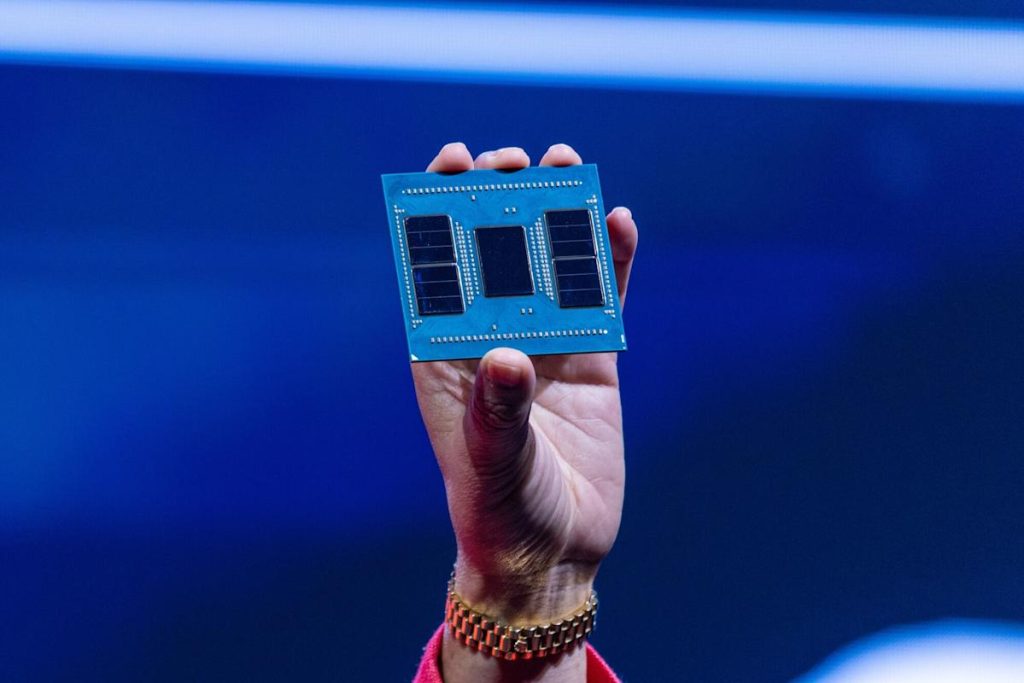(Bloomberg) — The Trump administration is preparing to announce a deal granting Saudi Arabia more access to advanced semiconductors, paving the way for increased data center capacity in the Gulf nation despite concerns from some US officials about its ties to China, according to people familiar with the matter.
Most Read from Bloomberg
The agreement would boost Saudi Arabia’s ability to buy chips from the likes of Nvidia Corp. and Advanced Micro Devices Inc., which are considered the gold standard for training and running artificial intelligence models, said the people, who asked not to be identified discussing confidential conversations. President Donald Trump is in Riyadh Tuesday, kicking off a broader Middle East trip, and he could announce the deal as soon as this week.
But while the two governments have reached an early-stage accord, they are still hashing out a number of key details, the people said. Front and center are US concerns that China could access chips sent to Saudi Arabia, either through the diversion of physical shipments or by tapping the capabilities of those chips via the cloud. One provision under discussion, the people said, would see the US government control access to data centers that use American chips. It’s not clear under what conditions, or to whom, access would be granted.
Representatives for the Saudi Arabian government and the White House didn’t immediately respond to requests for comment.
The deal is one of two major AI chip accords that Trump officials are negotiating as they prepare to rewrite US rules governing the export of advanced chips worldwide. Trump may announce the second agreement with the United Arab Emirates later in his trip, Bloomberg has reported.
Taken together, the deals indicate that Trump is much more willing than President Joe Biden to see advanced American technology shipped to the Gulf — a region where he also has major business interests and where sovereign wealth funds have pledged substantial investments in the US.
Nvidia shares gained 3.6% to $127.45 in New York on Tuesday, and AMD shares were up 1.6%.
Meanwhile on Tuesday, Nvidia Chief Executive Officer Jensen Huang announced that his company will be sending semiconductors to the new Saudi Arabian artificial intelligence company Humain for a 500-megawatt data center buildout. AI needs a lot of power, and energy-rich Saudi Arabia will be able to use Nvidia’s technology to unlock new capabilities in the field, Huang said at the Saudi-US Investment Forum in Riyadh.
Separately, the relatively new US tech firm Global AI struck a deal to collaborate with Humain in an agreement that’s expected to be worth billions of dollars, according to a person familiar with the matter. The US company, established a little over a year ago by a team of tech industry veterans, is building a data center in New York that will use Nvidia chips.
“We must take aggressive steps to prevent advanced semiconductors from being illegally diverted into China,” White House AI Adviser David Sacks wrote last week in a post on the social-media platform X. “But that goal should not preclude legitimate sales to the rest of the world as long as partners comply with reasonable security conditions.”
Washington has required companies to seek a license for AI chip sales to the UAE, Saudi Arabia and other Middle Eastern countries since 2023, in large part because of concerns the hardware could wind up in Beijing’s hands. Biden officials spent much of last year debating what conditions to apply to those shipments, with the goal of ensuring that American technology is protected from China — while not being so restrictive that third countries turn away from US hardware altogether.
As part of those conversations, Saudi Arabian officials began negotiating a bilateral accord with Biden’s team, according to people familiar with the matter. But, like the UAE, they abandoned those conversations after Trump won the US presidential election.
Now, Trump has his own version of that accord. In addition to provisions around facility access, the two sides have also discussed the idea of setting up so-called data embassies, under which data centers could be exempt from local data-protection regulations and could instead be subject to the laws of a foreign state, according to people familiar with the matter.
The goal of such a provision would be to help Saudi Arabia foster an “attractive environment for foreign governments and private sector entities to develop and adopt such technologies for peaceful purposes and uses,” according to a draft law spelling out the data embassies arrangement. The law, which does not mention the US deal, also highlights Saudi Arabia’s geographic position and ability to connect three continents.
Some European countries, such as Estonia, have relied on similar digital embassies to operate government IT facilities in other countries, designed to shield against security risks. The idea is also gaining some traction across the Gulf region. G42, the Abu Dhabi AI juggernaut, is exploring ways to set up digital embassies with government partnerships and for backing up critical infrastructure.
“We’re thinking about how to implement this, but as you can imagine, this is fairly complex,” Kiril Evtimov, the chief executive officer of Core42, the company’s cloud unit, said in an April interview. G42’s data center business, Khazna, has also said it plans to expand aggressively in Saudi Arabia.
–With assistance from Mark Bergen.
(Updates with Nvidia and Humain news starting in eighth paragraph)
Most Read from Bloomberg Businessweek
©2025 Bloomberg L.P.

